Our FORTE CULTURA travel recommendation
Route of castles and fortified towns in Alsace (page 3/4)
Developed by FORTE CULTURE Partner Alsace Destination Tourisme (ADT).
Wenn du dies siehst, nachdem deine Seite vollständig geladen wurde, fehlen leafletJS-Dateien.
25 Château de la Wasenbourg
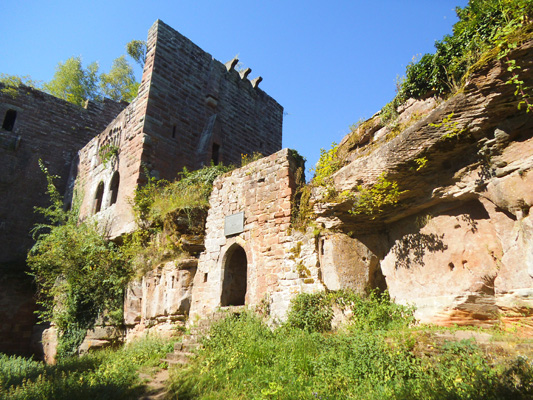
Classified as a historic monument on December 6, 1898, the Château features an exceptional Gothic window with 9 lancets and 7 oculi, unique in Alsace, set in a flattened arch with restored mullions. An imposing shield wall, 4 meters thick, protects the courtyard and the residence. Inside, a frieze decorated with a human head from the 13th century adorns the residence. A commemorative plaque marks Goethe's visit in 1771. Behind the ruins, there are remnants of a Gallo-Roman temple dedicated to Mercury. A Roman relief of Mercury is displayed at the archaeology museum in Niederbronn-les-Bains.
67110 Niederbronn les Bains
www.alsace-verte.com
(Image ©G.Maciel - ADT)
26 Château de Wasigenstein

Two castle ruins stand on rocky outcrops separated by a natural fault. To the east is the Grand-Wasigenstein, built in the mid-13th century as an imperial castle with a pentagonal keep. To the west is the Petit-Wasigenstein, erected around 1299 by a branch of the Wasigenstein family, which turns its keep and shield wall toward its neighbor. With the extinction of the Wasigenstein line in the 14th century, the castles changed hands among various owners, including the Fleckenstein and Hohenbourg, before being destroyed during the Thirty Years' War. Remnants include staircases, rock-hewn rooms, and a cistern.
67510 Niedersteinbach
(Image ©M. Schampion - ADT)
27 Ruines des Châteaux du Nideck
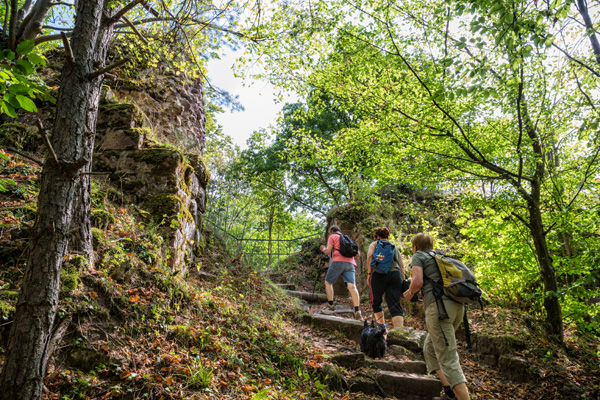
The Château du Nideck, a medieval remnant, is located in Oberhaslach, 40 km from Strasbourg. It consists of two distinct castles resulting from a family division documented in 1336. The castles sit on a 534-meter ridge overlooking the Hasel Valley. The upper castle features a moat, while the lower, dating from the mid-13th century, has a square keep. First mentioned in 1264, it was a fief of the Bishop of Strasbourg. In 1448, it was besieged during the Wasselonne War and was destroyed by fire in 1636. The legend of Nideck inspired the poet Adelbert von Chamisso.
67280 Oberhaslach
www.chateauxfortsalsace.com
(Image ©E.List - ADT)
28 Château du Morimont

The Morimont castle is currently closed to the public for renovations. However, you can walk around the ruins and glimpse the interior and vaulted cellar through the grilles. First mentioned in 1183, this castle controlled the upper valley of the Largue. It was destroyed during the Thirty Years' War by French troops. In 1826, Jura patriots swore to free their country from Bernese rule, which was accomplished in 1978. Explore the ramparts, towers, and the exceptional vaulted cellar, unique in Alsace, while enjoying the access path.
68480 Oberlarg
www.sundgau-sudalsace.fr
(Image ©Pictural - ADT)
29 Château du Kagenfels
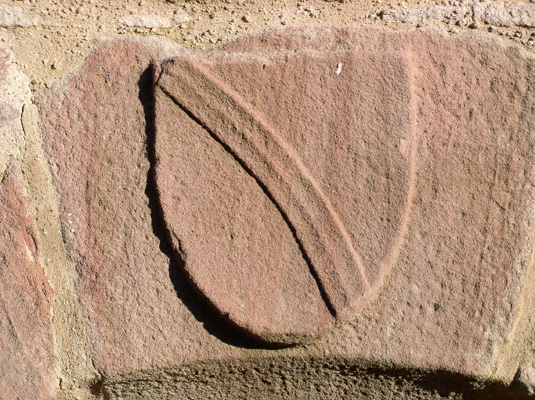
The castle, built in about 1262 by Albrecht Kagen, was destroyed four times in the 14th and 15th centuries.Rebuilt circa 1430, and then enlarged and elevated in around 1507 by the Uttenheims, it was abandoned as early as the end of the 16th century. Since 2002, an archaeological dig and restoration worksite has revealed a castle that is amazing for its richness and dimensions.
67210 Obernai
www.kagenfels.org
(Image ©Kagenfels 2)
30 Château du Petit-Arnsbourg
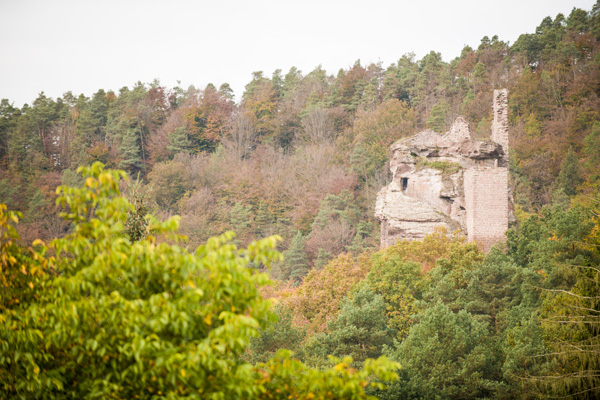
A true eagle's nest built in the 14th century as a forward post by the Abbey of Wissembourg, the castle was held as a fief in 1335 by the knight Frederick of Wasigenstein, who became a highwayman. The peacekeepers intervened militarily to besiege the castle. In 1360, it was occupied by the lords of Ochsenstein. Upon their extinction, the castle passed in 1485 to the Counts of Deux-Ponts-Bitche, who undertook its restoration. It changed hands several times before becoming the property of the Counts of Hanau-Lichtenberg in 1606, and was likely dismantled after the Thirty Years' War. Remnants include staircases and rock-hewn passages, as well as vestiges of the lordly palace.
67510 Obersteinbach
www.alsace-verte.com
(Image ©OTI de l'Alsace Verte - C.Fleckinger)
31 Château de Lutzelhardt
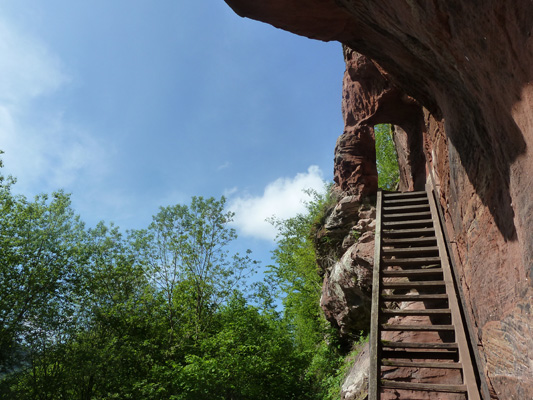
The construction of the castle is attributed to the Duke of Lorraine around the mid-12th century to protect the Abbey of Sturzelbronn. In 1297, the Counts of Bitche, guardians of the Lorraine border, acquired the castle. It became a subordinate fief of the Fleckenstein in 1363, and then fell into the hands of Wirich of Hohenbourg in 1450. In 1570, the castle was occupied by the Duke of Lorraine's troops and was abandoned in 1606. Some believe that Lutzelhardt was already in ruins, possibly destroyed during the Peasants' War in 1525, while others suggest it was destroyed during the Thirty Years' War. Today, remnants of a square keep, several lodgings, a well, and a cistern remain.
67510 Obersteinbach
www.chateauxfortsalsace.com
(Image ©M. Schampion - ADT)
32 Château du Haut-Koenigsbourg

Perched on a Vosges summit, the Haut-Koenigsbourg castle is one of the most iconic sites in Alsace. Built in the 12th century, it was remodeled in the 15th century, becoming an imposing fortress and a symbol of imperial power. Its thick walls, majestic towers, and beautifully decorated halls tell the tumultuous history of the region. The panoramic view it offers of the Alsace plain and the surrounding Vosges makes it a popular destination for visitors. Haut-Koenigsbourg captivates with its architecture and fascinating history.
67600 Orschwiller
www.haut-koenigsbourg.fr
(Image ©C.FLEITH - ADT)
33 Château du Birkenfels
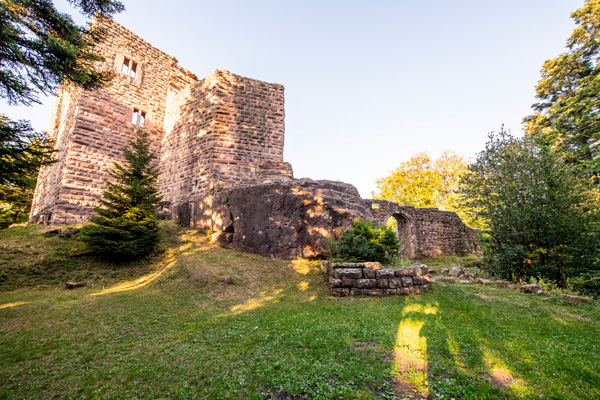
Discover a charming little residential castle, built around 1260. Its main building, structured over three levels, features niche arrow slits and large multi-window bays that let in light and offer views of the surrounding landscapes. Although the pentagonal donjon remains unfinished, it adds an air of mystery and character to this structure. This castle invites you to delve into the past while enjoying the authenticity and charm of old stones.
67530 Ottrott
www.alsace-verte.com
(Image ©INFRA - ADT)
34 Les châteaux d'Ottrott
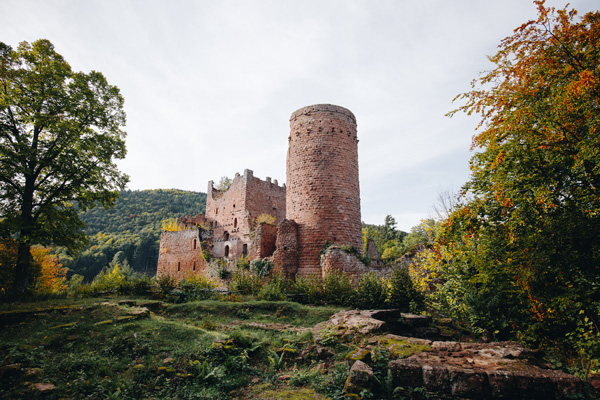
The Rathsamhausen and the Lutzelbourg are two majestic medieval castles overlooking the Alsace plain near the village of Ottrott. The Rathsamhausen stands out for its unique "donjon-palace" in Alsace, whose impressive ruins provide a fascinating glimpse into the lives of its former inhabitants.
67530 Ottrott
Facebook
(Image ©Hello Travelers-Margot & Julien-ADT)
35 Château de Girsberg
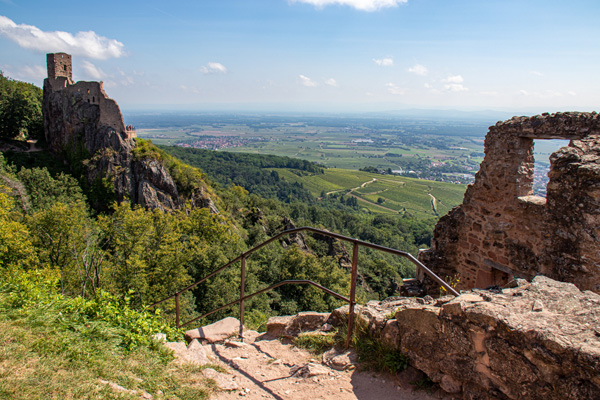
Perched on nearly inaccessible rocks, facing St. Ulrich Castle, Grisberg Castle, with its pentagonal donjon, was built around 1250 by the Ribeaupierre on a rocky spur, likely to reinforce their defense. This small structure never served as a residence for the Ribeaupierre. In the early 14th century, it was granted to the noble Girsberg family, who gave it their name. The visible remains today date from several periods: the pentagonal donjon, made of stone, granite, and sandstone, dates back to the 13th century and is classified as a historical monument. The residential building, consisting of two structures and a semicircular tower, dates from the 14th century.
68150 Ribeauville
(Image ©D. Lett - ADT)
36 Château du Haut Ribeaupierre

Above Ribeauvillé, Haut-Ribeaupierre, formerly known as “Altencastel,” rises at an altitude of 645 m. Built in the 12th century to secure Château Saint-Ulrich, it is first mentioned in 1254. A round tower protects the main building, overlooking a courtyard with a vaulted cistern. The moat and curtain wall to the east enhance its defense. In 1288, Anselme de Ribeaupierre resides there. The castle serves as a prison during the Hundred Years' War and is abandoned in the 16th century. Today, its ruins are being renovated.
68150 Ribeauville
(Image ©INFRA - ADT)

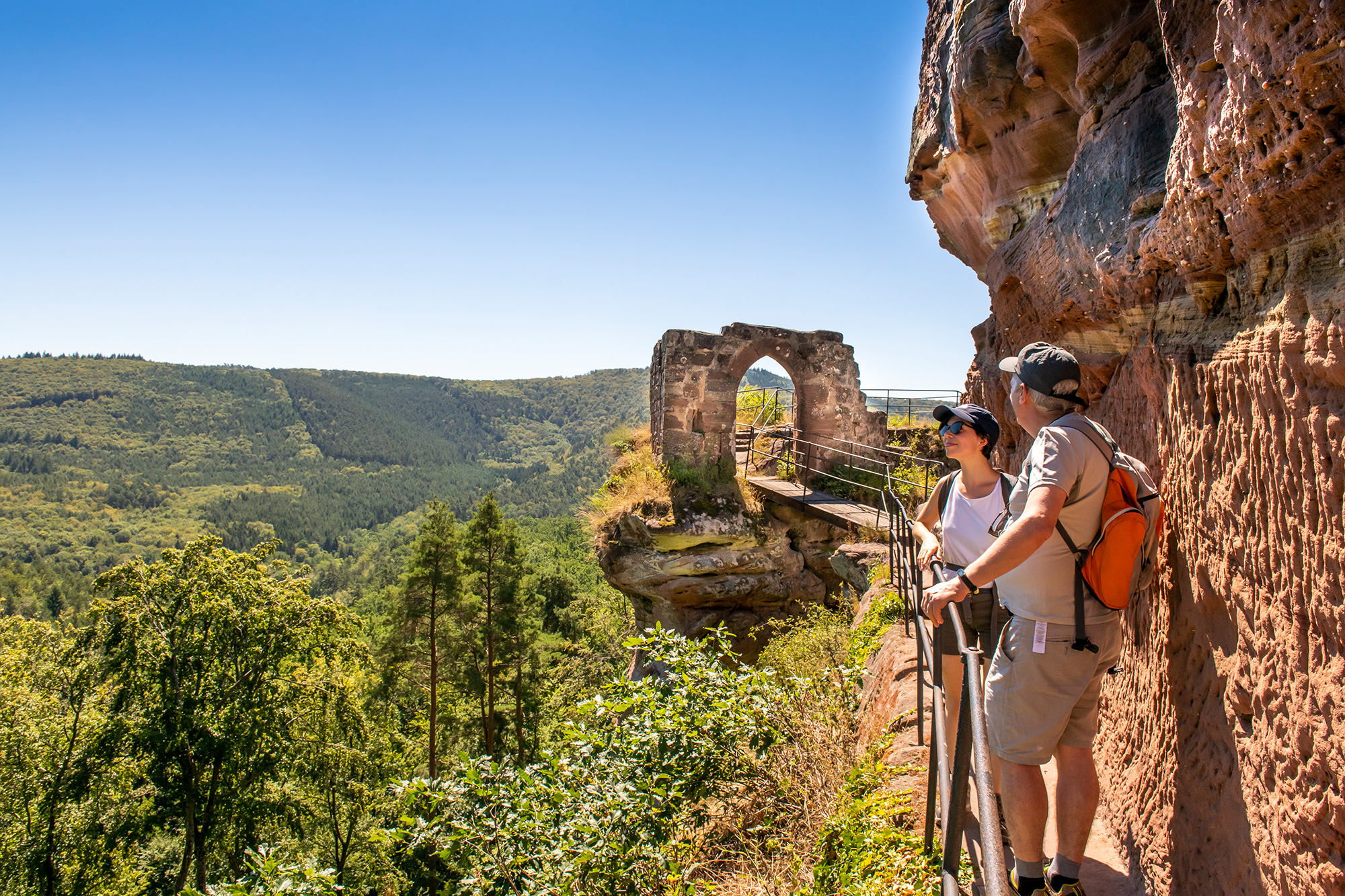
Schreibe einen Kommentar